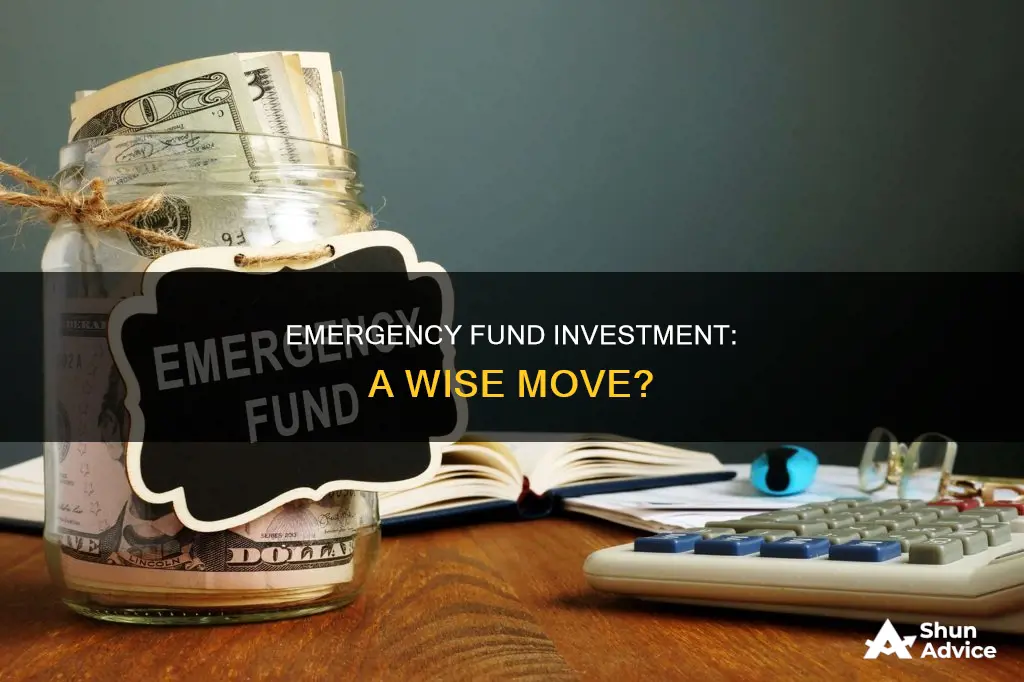
Emergency funds are a key part of financial planning and are designed to cover sudden and unexpected costs, such as medical bills or car repairs. The general rule of thumb is to save enough to cover three to six months' worth of living expenses. But what should you do with this money? Should it be kept in a savings account or invested in the stock market or other assets?
There are pros and cons to investing an emergency fund. On the one hand, investing could lead to higher returns on your money. On the other hand, there is a risk of losing money, and it may be harder to access your funds when you need them.
So, what's the best option? Well, it depends on your personal situation and risk tolerance. Some financial experts advise against investing emergency funds due to the potential risks involved. They recommend keeping emergency funds in liquid assets, such as high-yield savings accounts, money market accounts, or certificates of deposit (CDs). These options offer a balance between earning returns and maintaining easy access to your money.
However, others suggest that investing your emergency fund can be a viable option, especially if you are less reliant on immediate cash. If you choose to invest, consider options like money market accounts, high-yield savings accounts, or a Roth IRA, which offer both potential returns and relatively easy access to your funds.
Ultimately, the decision to invest your emergency fund is a personal one and should be made carefully, considering your financial situation and risk tolerance.
What You'll Learn

The pros of investing an emergency fund
While investing an emergency fund is generally not recommended due to the associated risks, there are some potential benefits to doing so. Here are the pros of investing an emergency fund:
Higher Returns
By investing your emergency fund, you could achieve a higher return on your money compared to keeping it in a traditional savings account. Money market accounts, high-yield bank accounts, and other investment options often offer higher interest rates, currently exceeding 4% APY. This means your emergency fund could grow faster, potentially providing more financial security in the long run.
Easy Access to Funds
Contrary to popular belief, certain investment options allow you to withdraw your money relatively easily. Money market accounts, high-yield bank accounts, and Roth IRAs are examples of investments that provide easy access to your funds. With a Roth IRA, for instance, you can withdraw contributions at any time without incurring a penalty, offering flexibility for emergency situations.
Beating Inflation
By investing your emergency fund, you have the potential to beat inflation and protect your money's purchasing power. Keeping a large sum of money in a low-interest savings account may result in losing value over time due to inflation. Investing allows you to aim for returns that outpace inflation, preserving the value of your emergency fund.
Diversification
Investing your emergency fund can be part of a diversification strategy. Diversification is a risk management technique that involves spreading your investments across various asset classes. By investing your emergency fund, you can balance the risks and rewards of your overall portfolio.
Long-Term Growth
If you have a long-term investment horizon, investing your emergency fund could result in substantial growth over time. Historically, the stock market has provided average annual returns of around 10%. While there may be short-term fluctuations, investing for the long term can increase the likelihood of positive returns and help your emergency fund keep pace with economic growth.
Reporting Mutual Fund Investments on Tax Returns
You may want to see also

The cons of investing an emergency fund
Investing your emergency fund is generally not recommended due to the potential risks involved. Here are some detailed reasons why investing your emergency fund may not be a good idea:
Risk of Losing Money
Investing in the stock market or other volatile assets can expose your emergency fund to potential losses. The stock market can fluctuate, and you may be forced to sell at a loss when you need the money. Even if you invest in a mutual fund or carefully choose stocks, there is always some risk involved. The market can dip at any given point, which can be problematic if your investments decrease in value just when you need to use them.
Difficulty in Accessing Funds
Placing your emergency fund in certain investments, such as retirement accounts or certificates of deposit (CDs), can make it difficult and time-consuming to access your money. Withdrawing funds from a retirement account can take several weeks and may incur financial penalties. Similarly, early withdrawals from CDs typically trigger an early withdrawal fee. In contrast, keeping your emergency fund in a savings or checking account provides easy and immediate access to your funds when needed.
Impact on Liquidity
Investing your emergency fund in less liquid assets, such as real estate, can reduce your liquidity. It may take time to sell these assets and convert them into cash, especially if you need to sell quickly to cover an emergency expense. This lack of liquidity can be a significant disadvantage when facing unexpected costs.
Volatility and Uncertainty
Investments like stocks and mutual funds are subject to market volatility and uncertainty. While they may offer higher potential returns, they also carry a higher risk of loss. In contrast, keeping your emergency fund in a high-yield savings account or money market account provides a more stable and predictable return, even if the interest rates are lower.
Potential Opportunity Cost
While investing your emergency fund may offer the possibility of higher returns, it's important to consider the opportunity cost. By keeping a large sum of money in an emergency fund, you may be forgoing potential gains in other investment opportunities or tax-advantaged retirement accounts. Balancing your emergency fund with other investment strategies can help maximize your overall financial growth.
How to Reinvest Dividends with Chase You Invest Mutual Funds
You may want to see also

High-yield savings accounts
Earn Extra Interest
By choosing a high-yield account, you can earn more interest on your emergency fund. Most checking accounts and traditional savings accounts pay little to no interest, so your money will likely lose value due to inflation if kept in these accounts. With a high-yield savings account, you can maximise the money your emergency savings earn while waiting to be used. These extra funds can help increase the amount you have invested for unexpected expenses.
Keep the Money Separate from Your Bank Account
It is important to keep your emergency savings separate from your regular checking account to prevent inadvertently spending it on non-emergencies. If your emergency fund is in a separate high-yield savings account, you'll know it's earmarked for emergencies, and you'll be less likely to use it for other things.
Easier to Track Your Funds
Keeping your emergency fund in a separate high-yield savings account allows you to easily track how much you have invested for emergencies at all times. This is especially helpful when you are still in the process of building up your emergency fund. You can set up automated transfers to your emergency fund each month and monitor your progress to ensure you're on track to saving the recommended amount as soon as possible.
Ensure You Can Access Your Emergency Savings When You Need It
You may be tempted to invest your emergency fund in other assets such as stocks, bonds, or CDs. However, with a high-yield savings account, your money is accessible when you need it. You won't risk facing losses or having to sell investments at an inopportune time. You will be able to quickly and easily access your emergency money when unexpected expenses arise.
Other Benefits
Negative-Yield Bond Investment: Why Do Funds Take the Risk?
You may want to see also

Money market accounts
- Vio Bank Cornerstone Money Market Account: This account offers a competitive interest rate of 5.05% APY on all balances. It requires a minimum deposit of $100 and has no monthly fee.
- Quontic Money Market Account: This account offers a 5.00% APY on all balances. It has a minimum opening deposit of $100 and comes with a debit card.
- Ally Bank Money Market Account: This account offers a 4.00% APY across all balance tiers and has no monthly fee or minimum amount required to open an account. It offers a debit card and check-writing privileges.
- Sallie Mae Money Market Account: This account offers a 4.20% APY on any balance and has no minimum balance requirement or monthly fee. It also comes with check-writing privileges.
- EverBank Performance Money Market: This account offers tiered rates, with a 4.00% APY on balances between $50,000 and $100,000. There is no minimum amount required to open an account or monthly fee.
- First Foundation Bank Online Money Market: This account offers a 4.90% APY and requires a $1,000 minimum opening deposit. It has no monthly fee and offers a debit card and check-writing privileges.
Unlocking Down Payment Strategies for Your Next Investment Property
You may want to see also

Certificates of deposit (CDs)
CDs are a safe and conservative investment option, and they are typically backed by the Federal Deposit Insurance Corporation (FDIC) or the National Credit Union Administration (NCUA), providing insurance coverage of up to $250,000. This means that even if the bank or credit union goes bankrupt, your principal will likely be repaid.
CDs generally offer higher interest rates than savings and money market accounts, making them an attractive option for savers who want to earn more without taking on additional risk. However, one of the downsides of CDs is that your money is locked into the investment, which can be a disadvantage if you need to access your funds early.
When considering a CD for your emergency fund, it's important to weigh the pros and cons. On the one hand, CDs offer a guaranteed fixed interest rate, predictable returns, diverse term options, higher interest rates compared to traditional savings accounts, and security. On the other hand, there are limitations on liquidity, early withdrawal penalties, inflation risk, opportunity cost, and interest rate risk.
While CDs can provide a safe harbour for your money and a structured approach to savings growth, they might not be the best choice for emergency funds if you need unplanned access to your money. Setting up a CD for a short time could give your savings a little boost, but emergencies can happen at any time and may not align with your CD terms.
Aquabounty's Mutual Fund Investors: Who's Taking the Plunge?
You may want to see also
Frequently asked questions
No, it is not a good idea to invest your emergency fund. While it could work out, there is a serious risk involved. Your emergency fund could decrease in value before you need to use it.
The purpose of an emergency fund is to protect yourself from financial emergencies. If you invest your emergency fund, you are putting it at risk. For example, if you invest your emergency fund in the stock market, you could lose money as the stock market can go up and down quite a bit over short periods of time.
The best place for an emergency fund is a high-yield savings account. Your money will be safe and insured, and you can also earn a competitive interest rate on it.
The general rule of thumb is to save enough to cover three to six months of living expenses.







